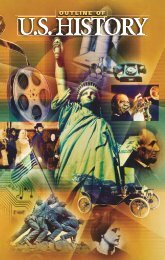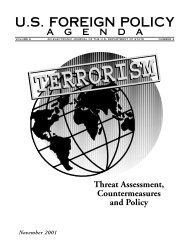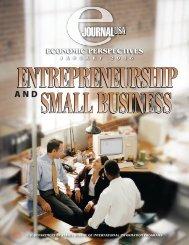Working for Women Worldwide - Embassy of the United States
Working for Women Worldwide - Embassy of the United States
Working for Women Worldwide - Embassy of the United States
Create successful ePaper yourself
Turn your PDF publications into a flip-book with our unique Google optimized e-Paper software.
turned out, hundreds <strong>of</strong> Afghan women ga<strong>the</strong>red at<br />
that center and walked miles to <strong>the</strong> nearest voters’ registration<br />
site. “They showed <strong>the</strong>ir voice through<br />
action,” Ponticelli stressed. “This is <strong>the</strong> impact <strong>the</strong>se<br />
programs can have.”<br />
Initiatives <strong>for</strong> <strong>Women</strong><br />
in All Regions<br />
O<strong>the</strong>r regions <strong>of</strong> <strong>the</strong> world are just as important<br />
to <strong>the</strong> U.S. ef<strong>for</strong>t to enhance women’s political participation.<br />
In post-conflict societies<br />
from <strong>the</strong> <strong>for</strong>mer<br />
Yugoslavia to Colombia<br />
and <strong>the</strong> Congo, <strong>the</strong><br />
<strong>United</strong> <strong>States</strong> has led<br />
ef<strong>for</strong>ts to ensure that<br />
women are included as<br />
planners, implementers,<br />
and beneficiaries <strong>of</strong> international<br />
recovery and<br />
reconstruction work.<br />
The <strong>United</strong> <strong>States</strong><br />
supports initiatives all<br />
over <strong>the</strong> world that help<br />
women acquire <strong>the</strong> skills<br />
necessary to become fully engaged in <strong>the</strong> political<br />
process. In Africa, <strong>for</strong> example, <strong>the</strong> <strong>United</strong> <strong>States</strong> has<br />
partnered with nongovernmental organizations to<br />
provide women leadership training. Be<strong>for</strong>e <strong>the</strong> 2002<br />
elections in Senegal, <strong>the</strong> National Democratic<br />
Institute trained more than 2,000 women in campaign<br />
techniques and skills. The result was impressive: 93<br />
percent <strong>of</strong> <strong>the</strong> more than 1,500 women elected to local<br />
government positions in <strong>the</strong> elections had participated<br />
in this comprehensive training.<br />
The ALVA Consortium, a nongovernmental<br />
organization based in Washington, D.C., is training<br />
many women in Africa in political skills and how to<br />
run <strong>for</strong> <strong>of</strong>fice. With $400,000 from <strong>the</strong> State<br />
Department’s Human Rights and Democracy Fund,<br />
this group’s program is reaching women in Kenya,<br />
Rwanda, Uganda, and Angola. In both Kenya and<br />
Rwanda, several women who received ALVA<br />
Consortium training have been elected to public <strong>of</strong>fice<br />
or appointed to high-level government positions.<br />
In Liberia, Nigeria, Sudan, and <strong>the</strong> self-declared<br />
Republic <strong>of</strong> Somaliland, <strong>the</strong> International Republican<br />
Institute is using a U.S. grant <strong>of</strong> $897,000 to partner<br />
with Muslim civic groups to increase Muslim<br />
women’s participation in politics and civil society and<br />
to increase men’s support <strong>for</strong> and cooperation with<br />
women’s activism. This project addresses what<br />
Sauerbrey has called one <strong>of</strong> <strong>the</strong> greatest impediments<br />
to women’s empowerment—<strong>the</strong> cultural barrier <strong>of</strong> differing<br />
expectations <strong>for</strong> women and men.<br />
Sauerbrey, who led a team <strong>of</strong> trainers in Cote<br />
d’Ivoire in August 2004<br />
that included Josie Bass,<br />
president <strong>of</strong> ALVA<br />
Consortium, and Odette<br />
Nyiramilimo, a Rwandan<br />
senator and founder <strong>of</strong><br />
<strong>the</strong> Coalition <strong>of</strong> Rwandan<br />
<strong>Women</strong> Leaders, has seen<br />
firsthand <strong>the</strong> impact <strong>of</strong><br />
U.S training initiatives.<br />
“The workshops in Cote<br />
d’Ivoire,” Sauerbrey explained,<br />
have “inspired a<br />
number <strong>of</strong> women to run<br />
<strong>for</strong> political <strong>of</strong>fice. We<br />
watched <strong>the</strong>m develop <strong>the</strong><br />
skills and confidence to do it.”<br />
The State Department and USAID have also<br />
provided funding to nongovernmental organizations in<br />
Eastern Europe and Eurasia to conduct women’s<br />
leadership programs. Prior to <strong>the</strong> 2000 elections in<br />
Serbia, <strong>for</strong> example, <strong>the</strong> National Democratic<br />
Institute used U.S. funding to provide training,<br />
polling, and strategic consultations to attract women<br />
voters. In Russia, <strong>the</strong> International Republican<br />
Institute is coordinating a women’s parliamentary<br />
program that <strong>of</strong>fers training in parliamentary procedures,<br />
how to draft legislation, and how to run a communication<br />
program. The U.S. <strong>Embassy</strong> in Belarus<br />
works with women’s organizations to promote democracy<br />
and political activism.<br />
In Kazakhstan, <strong>the</strong> State Department is funding<br />
a $400,000 project to increase <strong>the</strong> participation <strong>of</strong><br />
provincial women in <strong>the</strong> electoral process, public policy<br />
<strong>for</strong>mation, and <strong>the</strong> oversight <strong>of</strong> local legislative bodies.<br />
In Tajikistan, NDI is managing a $500,000 project<br />
to develop a women’s political network to train<br />
women candidates and increase women’s participation<br />
in <strong>the</strong> country’s political development.<br />
40












